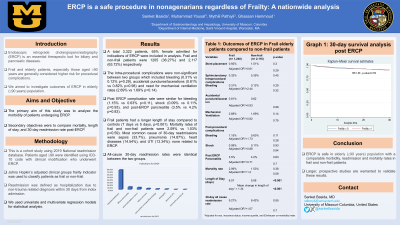Monday Poster Session
Category: Interventional Endoscopy
P2273 - ERCP Is a Safe Procedure in Nonagenarian Patients Regardless of Frailty: A Nationwide Analysis
Monday, October 23, 2023
10:30 AM - 4:15 PM PT
Location: Exhibit Hall

Has Audio

Sanket Basida, MD
University of Missouri at Columbia
Columbia, MO
Presenting Author(s)
Sanket Basida, MD1, Muhammad Nadeem. Yousaf, MD2, Ghassan M. Hammoud, MD2, Mythili Menon Pathiyil, MD3
1University of Missouri at Columbia, Columbia, MO; 2University of Missouri-Columbia, Columbia, MO; 3Saint Vincent Hospital, Worcester, MA
Introduction: Endoscopic retrograde cholangiopancreatography (ERCP) is an essential therapeutic tool for biliary and pancreatic diseases. Frail and elderly patients, especially those aged ≥90 years are generally considered a high-risk population for ERCP related complications. We aimed to investigate the outcomes of ERCP in elderly (≥90 years) population.
Methods: This is a cohort study using 2019 National readmission database. Patients aged ≥90 were identified using ICD-10 code with clinical modification who underwent ERCP. Johns Hopkin’s adjusted clinical groups frailty indicator was used to classify patients as frail or non-frail. Readmission is defined as hospitalization due to non-trauma related diagnosis within 30 days from index admission. The primary outcome was morbidity. The secondary outcomes were mortality and 30-days readmission rate related to ERCP. We used univariate and multivariate regression models for statistical analysis.
Results: A total 3,322 patients, 65% female underwent ERCP were included in the analysis. Frail and non-frail patients were 1205 (36.27%) and 2,117 (63.72%) respectively. The indications of ERCP were choledocholithiasis (74.82%), biliary pancreatitis (9.81%), pancreaticobiliary cancer (7.52%), biliary stricture (3.83%), pancreatitis of unspecified etiology (2.24%), cholangitis (1.55%), abnormal LFTs (0.13%), and pancreatic pseudocyst (0.05%). The overall intra-procedural complications were non-significant between frail and non-frail patients. These include bleeding (0.31% vs 0.12%, p=0.29), accidental punctures/lacerations (0.81% vs 0.82%, p=0.98) and need for mechanical ventilation rates (2.69% vs 1.69%, p=0.14). Post ERCP complications rate were similar for bleeding (1.15% vs 0.63%, p=0.11), shock (0.09% vs 0.11%, p=0.93), and post-ERCP pancreatitis (3.5% vs 4.2%, p=0.83). Frail had a longer length of stay compared to non-frail patients (7 days vs 5 days, p< 0.001). The mortality rates of frail and non-frail patients were 2.09% vs 1.53%, p=0.59). The most common cause of 30-days readmission in both groups were sepsis (33.7%), pneumonia (14.87%), heart diseases (14.54%), and UTI (13.34%). There was no readmission due to ERCP related complications in both groups. All-cause 30-day readmission rates were identical between the two groups.
Discussion: ERCP is safe in elderly (≥90 years) population with a comparable morbidity, readmission and mortality rates in frail and non-frail patients. Larger, prospective studies are warranted to validate these results.
Disclosures:
Sanket Basida, MD1, Muhammad Nadeem. Yousaf, MD2, Ghassan M. Hammoud, MD2, Mythili Menon Pathiyil, MD3. P2273 - ERCP Is a Safe Procedure in Nonagenarian Patients Regardless of Frailty: A Nationwide Analysis, ACG 2023 Annual Scientific Meeting Abstracts. Vancouver, BC, Canada: American College of Gastroenterology.
1University of Missouri at Columbia, Columbia, MO; 2University of Missouri-Columbia, Columbia, MO; 3Saint Vincent Hospital, Worcester, MA
Introduction: Endoscopic retrograde cholangiopancreatography (ERCP) is an essential therapeutic tool for biliary and pancreatic diseases. Frail and elderly patients, especially those aged ≥90 years are generally considered a high-risk population for ERCP related complications. We aimed to investigate the outcomes of ERCP in elderly (≥90 years) population.
Methods: This is a cohort study using 2019 National readmission database. Patients aged ≥90 were identified using ICD-10 code with clinical modification who underwent ERCP. Johns Hopkin’s adjusted clinical groups frailty indicator was used to classify patients as frail or non-frail. Readmission is defined as hospitalization due to non-trauma related diagnosis within 30 days from index admission. The primary outcome was morbidity. The secondary outcomes were mortality and 30-days readmission rate related to ERCP. We used univariate and multivariate regression models for statistical analysis.
Results: A total 3,322 patients, 65% female underwent ERCP were included in the analysis. Frail and non-frail patients were 1205 (36.27%) and 2,117 (63.72%) respectively. The indications of ERCP were choledocholithiasis (74.82%), biliary pancreatitis (9.81%), pancreaticobiliary cancer (7.52%), biliary stricture (3.83%), pancreatitis of unspecified etiology (2.24%), cholangitis (1.55%), abnormal LFTs (0.13%), and pancreatic pseudocyst (0.05%). The overall intra-procedural complications were non-significant between frail and non-frail patients. These include bleeding (0.31% vs 0.12%, p=0.29), accidental punctures/lacerations (0.81% vs 0.82%, p=0.98) and need for mechanical ventilation rates (2.69% vs 1.69%, p=0.14). Post ERCP complications rate were similar for bleeding (1.15% vs 0.63%, p=0.11), shock (0.09% vs 0.11%, p=0.93), and post-ERCP pancreatitis (3.5% vs 4.2%, p=0.83). Frail had a longer length of stay compared to non-frail patients (7 days vs 5 days, p< 0.001). The mortality rates of frail and non-frail patients were 2.09% vs 1.53%, p=0.59). The most common cause of 30-days readmission in both groups were sepsis (33.7%), pneumonia (14.87%), heart diseases (14.54%), and UTI (13.34%). There was no readmission due to ERCP related complications in both groups. All-cause 30-day readmission rates were identical between the two groups.
Discussion: ERCP is safe in elderly (≥90 years) population with a comparable morbidity, readmission and mortality rates in frail and non-frail patients. Larger, prospective studies are warranted to validate these results.
Disclosures:
Sanket Basida indicated no relevant financial relationships.
Muhammad Yousaf indicated no relevant financial relationships.
Ghassan Hammoud indicated no relevant financial relationships.
Mythili Menon Pathiyil indicated no relevant financial relationships.
Sanket Basida, MD1, Muhammad Nadeem. Yousaf, MD2, Ghassan M. Hammoud, MD2, Mythili Menon Pathiyil, MD3. P2273 - ERCP Is a Safe Procedure in Nonagenarian Patients Regardless of Frailty: A Nationwide Analysis, ACG 2023 Annual Scientific Meeting Abstracts. Vancouver, BC, Canada: American College of Gastroenterology.
